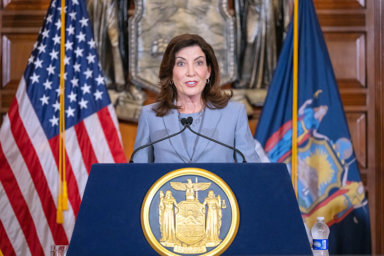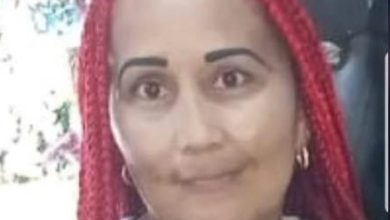Hochul highlights plan to aggressively expand New York’s legal cannabis market, crack down on illegal sales

Gov. Kathy Hochul on Wednesday announced the largest expansion of New York State’s legal cannabis market to date, with hundreds of licenses being made available to individuals and businesses interested in legally growing, processing, distributing and selling cannabis.
The application period opened on Wednesday and will remain so for two months.
The governor also announced the results of continued aggressive enforcement against the illegal sale of cannabis across the state undertaken by the Office of Cannabis Management (OCM) and the Department of Taxation and Finance (DTF), which to date has yielded the seizure of more than 8,500 pounds of illicit product with an estimated street value of more than $42 million.
She also announced new partnerships with localities that will enable them to pursue padlocking orders against businesses illegally selling cannabis from State courts, and a new multi-agency initiative to target illegal operators for labor violations, thus significantly increasing fines and penalties that businesses may face.
Hochul said New York’s legal cannabis market is now poised to be one of the largest in the world.
She said it is “one that will ultimately generate hundreds of millions in revenue annually, as well as create or sustain thousands of jobs across the State, all while prioritizing equity, promoting small business growth, ensuring product quality and maintaining consumer safety.
“We know there’s room for improvement as New York works to launch a brand-new cannabis industry and crack down on illicit operators, and I’m committed to working with all stakeholders to get the job done right,” Gov. Hochul said.
“My administration is laser-focused on shutting down illegal storefronts, protecting the health and safety of children, and helping small businesses thrive,” she added. “We will continue working to build the most equitable adult-use cannabis industry in the nation that invests in communities and rights the wrongs of the past.”
Chris Alexander, executive director of New York State Office of Cannabis Management said, “This is a significant moment for entrepreneurs who have been waiting for an opportunity to join this consequential market. We’re building the biggest and fairest cannabis market in the world, and the opening of a new application window means an expansion of opportunity.
“New York’s market is centered around equity, with the nation’s strongest anti-trust protections in place that ensures small operators will forever have a place in our cannabis industry,” he said. “I appreciate Gov. Kathy Hochul’s fierce commitment to anti-trust regulations in cannabis, and I’m eager to see what this new crop of entrepreneurs can do to transform cannabis in and out of New York.”
Tremaine Wright, chair of New York State Cannabis Control Board (CCB) said, “New York State remains steadfast in its efforts to build an equitable, competitive and diverse cannabis industry.
“Today, the day our general application window opens, marks a huge step forward in making our vision of an equitable and accessible New York cannabis market a reality,” she said. “Under Gov. Hochul’s leadership, New York has ushered in strong rules and protections to ensure all licensed cannabis businesses have a real chance to compete.
“I am excited to continue working with the governor and the Office of Cannabis Management to grow this sector responsibly, thoughtfully, and in ways that acknowledge and correct the damage caused by a century of cannabis prohibition,” Wright added.
Starting today, Oct. 4, 2023, and lasting through Dec. 4, 2023, all eligible applicants will be able to apply for licenses for cultivation, processing, distribution, sale, or to operate a microbusiness.
Hochul said this will be a significant expansion of the existing market that is being expanded in phases to ensure that New York’s cannabis market grows in a stable way, avoiding the price shocks and collapses seen in other states that have resulted in the failure of small businesses and significant contractions in overall market value.
OCM and the CCB will accept applications for review and will begin awarding licenses for cultivators, processors, distributors, microbusinesses, and retail dispensaries in early 2024.
During this application window, the governor said currently operational Adult-Use Conditional Cultivators and Conditional Processors will also be able to apply to transition to full, non-conditional licenses.
She said entrepreneurs seeking to apply for licenses will be able to file their applications through the New York Business Express (NYBE) platform.
The regulations governing all categories of licenses were approved by the CCB on Sept. 12.
Hochul said these regulations create a framework for “an equitable and sustainable cannabis industry grounded in public health best practices, including keeping cannabis products out of the hands of youth, establishing product quality and safety guidelines, outlining employee training standards, and defining business security requirements to protect public safety.”
She said these regulations also incentivize sustainable cannabis operations by “prioritizing energy and resource efficiency and protecting against wasteful business practices.”
“Critically, these regulations maintain the equity goals laid out in New York’s Cannabis Law and the Marihuana Regulation & Taxation Act (MRTA),” Hochul said. “The finalized regulations are the result of significant public feedback, with OCM and the CCB receiving more than 4,000 comments between December 2022 and July 2023.”
The CCB anticipates issuing “a significant amount of retail licenses are adopting an approach that has the ultimate goal to ensure that New Yorkers have access to as many locations as possible to legally buy cannabis as quickly as possible.
“Owing to the constantly shifting nature of the retail environment and because the process of opening a storefront is both resource-intensive and lengthy, the number of retail licenses initially issued will likely be larger than the number of stores that are anticipated to open in this first phase,” it said. “This approach is designed to guard against market volatility, help small businesses enter the market and expand consumer access.”
Hochul announced on Wednesday the results of the last four months of aggressive enforcement against unlicensed cannabis businesses undertaken by OCM and DTF, which were granted new powers only in May of this year under a new law championed by the governor.
“By taking decisive action against unlicensed cannabis businesses, New York State is making a significant stride toward cracking down on unlawful cannabis operations that jeopardize public safety, consumer well-being, and the integrity of New York State’s legal cannabis market,” she said.
Since Jun. 7, she said OCM and DTF have conducted 246 inspections across the state, and have seized more than 8,500 pounds of illegal cannabis products, which have an estimated street value of more than $42 million.
The governor also announced today the results of concentrated enforcement actions on the West Side of Manhattan and in Downtown Brooklyn, two areas of New York City with a proliferation of illegal cannabis shops.
These actions, which took place just in the last two days, resulted in the seizure of nearly 150 pounds of product worth close to $600,000.
Hochul said businesses found to be illegally selling cannabis have been issued Notices of Violation and have also had Orders to Cease Unlicensed Activity affixed to the outside of the doors.
She said those businesses must now appear at an administrative hearing, where the final fines and penalties they will face will be determined.
Fines for the illegal sale of cannabis start at $10,000 per day and can rise up to $20,000 per day for the most egregious conduct.
An additional fine of $5,000 can be levied for removal of the Order, and the inspected businesses may also be subject to additional violations and penalties under the Tax Law.
The enforcement legislation passed in May also authorized OCM to seek a State court order to ultimately padlock businesses found to be in repeated violation of the law.
In addition, the law makes it a crime to sell cannabis and cannabis products without a license.
To bring many levels of government together to combat the illicit sale of cannabis, Gov. Hochul announced on Wednesday new partnerships between OCM and the Attorney General’s Office through which municipalities across the state can receive training on how to utilize a particular provision — Section16-A — of the new enforcement law signed by Gov. Hochul in May to pursue padlocking orders in State Court.
Section 16-A authorizes local governments, including county attorneys, to pursue padlocking orders based on inspections conducted by OCM and DTF without OCM having to petition the court for such an order against a business found to be engaged in egregious conduct.
“This authority significantly augments the ability for different levels of government to work together to shut down illegal cannabis operators,” Hochul said
New York Attorney General Letitia James said, “Expanding the number of cannabis licenses while simultaneously taking action against unlicensed sellers is a commonsense way to support small businesses and incentivize entrepreneurs to legally enter the marketplace.
“My office worked closely with the Office of Cannabis Management and Gov. Hochul to shut down unlicensed dispensaries, and we will continue to coordinate with our partners in government to ensure New York’s cannabis laws are upheld,” she said. “By holding unlicensed cannabis sellers accountable, my office is helping ensure New York can realize the intended purpose of MRTA, namely to remediate some of the societal harm caused by the so-called war on drugs.”
Hochul also highlighted the recent success by the City of Syracuse to leverage OCM and DTF inspections conducted against illegal operators together with the application of the State Property Maintenance Code to pursue closures of buildings the City deemed unfit or unlawful under the Code, another example of how municipalities can play an active role in combating the illicit market.
In addition to these new partnerships with localities, the Governor announced that several additional State agencies will now be bringing the weight of their business enforcement powers to bear as part of the State’s creative and aggressive approach to combating the illicit market.
She said the Department of Labor and the Workers Compensation Board (WCB) will join these efforts to ensure businesses suspected of selling cannabis without a license are compliant with New York State labor and workers compensation laws.
Hochul said if a business is found to have employees and not carry workers’ compensation insurance, the WCB may impose a Stop Work Order. Penalties are issued up to $2000.00 for each 10-day period of non-compliance based on the number of employees.
She said payrolls will be inspected to ensure employers are paying their employees the state’s minimum wage to include any eligible overtime, employees are allowed sick time and are compliant with the New York Health and Essential Rights Act (NY HERO Act) and COVID sick pay.
Fines for failure or late payment of wages, failure to provide sick leave, illegal deductions from wages, hours and payroll records, notices to employees, paystubs, tip appropriation are up to $1,000 for 1st violation, up to 2,000 for 2nd violation, up to $3,000 for 3rd and subsequent violation.
Hochul said similar fines for other violations may also be imposed, including lack of minimum wage posting, failure to cooperate with an investigation and failure to allow employee interviews, and underpayment of wages may bring fines of up to 200 percent of wages owed in addition to wage owed.





